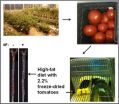Pre-college talk between parents and teens likely to lessen college drinking
2013-03-19
(Press-News.org) Teen-age college students are significantly more likely to abstain from drinking or to drink only minimally when their parents talk to them before they start college, using suggestions in a parent handbook developed by Robert Turrisi, professor of biobehavioral health, Penn State.
"Over 90 percent of teens try alcohol outside the home before they graduate from high school," said Turrisi. "It is well known that fewer problems develop for every year that heavy drinking is delayed. Our research over the past decade shows that parents can play a powerful role in minimizing their teens' drinking during college when they talk to their teens about alcohol before they enter college."
The researchers recruited 1,900 study participants by randomly selecting incoming freshmen to a large, public northeastern university. Each of the individuals was identified as belonging to one of four groups: nondrinkers, weekend light drinkers, weekend heavy drinkers and heavy drinkers.
The team mailed Turrisi's handbook to the parents of the student participants. The 22-page handbook contained information that included an overview of college student drinking, strategies and techniques for communicating effectively, ways to help teens develop assertiveness and resist peer pressure and in-depth information on how alcohol affects the body.
The parents were asked to read the handbook and then talk to their teens about the content of the handbook at one of three times to which they were randomly assigned: (1) during the summer before college, (2) during the summer before college and again during the fall semester of the first year of college and (3) during the fall semester of the first year of college.
"We were trying to determine the best timing and dosage for delivering the parent intervention," Turrisi said. "For timing, we compared pre-college matriculation to after-college matriculation. For dosage, we compared one conversation about alcohol to two conversations about alcohol."
The results appeared in a recent issue of the Journal of Studies on Alcohol and Drugs.
"We know that without an intervention there is movement from each drinking level into higher drinking levels," Turrisi said. "For example, non-drinkers tend to become light drinkers, light drinkers will become medium drinkers and medium drinkers will become heavy drinkers. Our results show that if parents follow the recommendations suggested in the handbook and talk to their teens before they enter college, their teens are more likely to remain in the non-drinking or light-drinking groups or to transition out of a heavy-drinking group if they were already heavy drinkers."
According to Turrisi, talking to teens in the fall of the first year of college may not work as well; for many families it had no effect on students' drinking behaviors. Likewise, adding extra parent materials in the fall seemed to have no additional benefit.
###
The National Institute on Alcohol Abuse and Alcoholism supported this research. Other authors on the paper include Kimberly Mallett, research associate professor, Penn State; Michael Cleveland, research assistant professor, Penn State; Lindsey Varvil-Weld, graduate student, Penn State; Caitlin Abar, postdoctoral fellow, Brown University; Nichole Scaglione, graduate student, Penn State; and Brittney Hultgren, graduate student, Penn State.
ELSE PRESS RELEASES FROM THIS DATE:
Brain-mapping increases understanding of alcohol's effects on first-year college students
2013-03-19
A research team that includes several Penn State scientists has completed a first-of-its-kind longitudinal pilot study aimed at better understanding how the neural processes that underlie responses to alcohol-related cues change during students' first year of college.
Anecdotal evidence abounds attesting to the many negative social and physical effects of the dramatic increase in alcohol use that often comes with many students' first year of college. The behavioral changes that accompany those effects indicate underlying changes in the brain. Yet in contrast to alcohol's ...
Conscientious people are more likely to have higher GPAs
2013-03-19
Conscientious people are more likely to have higher grade point averages, according to new research from psychologists at Rice University.
The paper examines previous studies that research the link between the "Big Five" personality traits –agreeableness, conscientiousness, extraversion, neuroticism and openness to experience – and college grade point average. It finds that across studies, higher levels of conscientiousness lead to higher college grade point averages. It also shows that five common personality tests are consistent in their evaluation of the "Big Five" ...
UCLA researchers create tomatoes that mimic actions of good cholesterol
2013-03-19
UCLA researchers have genetically engineered tomatoes to produce a peptide that mimics the actions of good cholesterol when consumed.
Published in the April issue of the Journal of Lipid Research and featured on the cover, their early study found that mice that were fed these tomatoes in freeze-dried, ground form had less inflammation and plaque build-up in their arteries.
"This is one of the first examples of a peptide that acts like the main protein in good cholesterol and can be delivered by simply eating the plant," said senior author Dr. Alan M. Fogelman, executive ...
High-carb intake in infancy has lifelong effects, UB study finds
2013-03-19
BUFFALO, N.Y. – Consumption of foods high in carbohydrates immediately after birth programs individuals for lifelong increased weight gain and obesity, a University at Buffalo animal study has found, even if caloric intake is restricted in adulthood for a period of time.
The research on laboratory animals was published this month in the American Journal of Physiology: Endocrinology and Metabolism; it was published online in December.
"This is the first time that we have shown in our rat model of obesity that there is a resistance to the reversal of this programming ...
Dartmouth researchers invent real time secondhand smoke sensor
2013-03-19
Making headway against a major public health threat, Dartmouth College researchers have invented the first ever secondhand tobacco smoke sensor that records data in real time, a new study in the journal Nicotine and Tobacco Research shows.
The researchers expect to soon convert the prototype, which is smaller and lighter than a cellphone, into a wearable, affordable and reusable device that helps to enforce no smoking regulations and sheds light on the pervasiveness of secondhand smoke. The sensor can also detect thirdhand smoke, or nicotine off-gassing from clothing, ...
Immigration reform needs to address access to health care
2013-03-19
With comprehensive immigration reform a priority for President Obama and gaining bipartisan and public support, there is a need and an opportunity to consider how the millions of undocumented immigrants should be integrated into our health care system, concludes a new report from The Hastings Center.
The report is the executive summary of the findings of a Hastings Center project that explored ethical, legal, and policymaking challenges that arise when undocumented immigrants living in the United States need medical care. It can be found on the project Web site, http://www.undocumentedpatients.org/executive-summary. ...
Researchers identify a promising target for Multiple Sclerosis treatments
2013-03-19
A team of basic and clinical scientists led by the University of Montreal Hospital* Research Centre's (CRCHUM) Dr. Nathalie Arbour has opened the door to significantly improved treatments for the symptoms of Multiple Sclerosis (MS). In a study selected as among the top 10% most interesting articles published in the Journal of Immunology, the team identifies the elevated presence in MS patients of a type of white blood cell (CD4 T cell) that expresses NKG2C, a highly-toxic molecule harmful to brain tissues.
In close collaboration with clinicians at the University of Montreal ...
An oxygen-poor 'boring' ocean challenged evolution of early life
2013-03-19
RIVERSIDE, Calif. — A research team led by biogeochemists at the University of California, Riverside has filled in a billion-year gap in our understanding of conditions in the early ocean during a critical time in the history of life on Earth.
It is now well accepted that appreciable oxygen first accumulated in the atmosphere about 2.4 to 2.3 billion years ago. It is equally well accepted that the build-up of oxygen in the ocean may have lagged the atmospheric increase by well over a billion years, but the details of those conditions have long been elusive because of ...
Petroleum use, greenhouse gas emissions of automobiles could drop 80 percent by 2050
2013-03-19
WASHINGTON -- A new National Research Council report finds that by the year 2050, the U.S. may be able to reduce petroleum consumption and greenhouse gas emissions by 80 percent for light-duty vehicles -- cars and small trucks -- via a combination of more efficient vehicles; the use of alternative fuels like biofuels, electricity, and hydrogen; and strong government policies to overcome high costs and influence consumer choices. While achieving these goals will be difficult, improving technologies driven by strong and effective policies could make deep reductions possible.
"To ...
Gone but not forgotten: Yearning for lost loved ones linked to altered thinking about the future
2013-03-19
People suffering from complicated grief may have difficulty recalling specific events from their past or imagining specific events in the future, but not when those events involve the partner they lost, according to a new study published in Clinical Psychological Science, a journal of the Association for Psychological Science.
The death of a loved one is among the most painful and disruptive experiences a person can face. For most, the grief subsides over time. But those who suffer from complicated grief continue to yearn for the lost loved one, experience waves of painful ...


